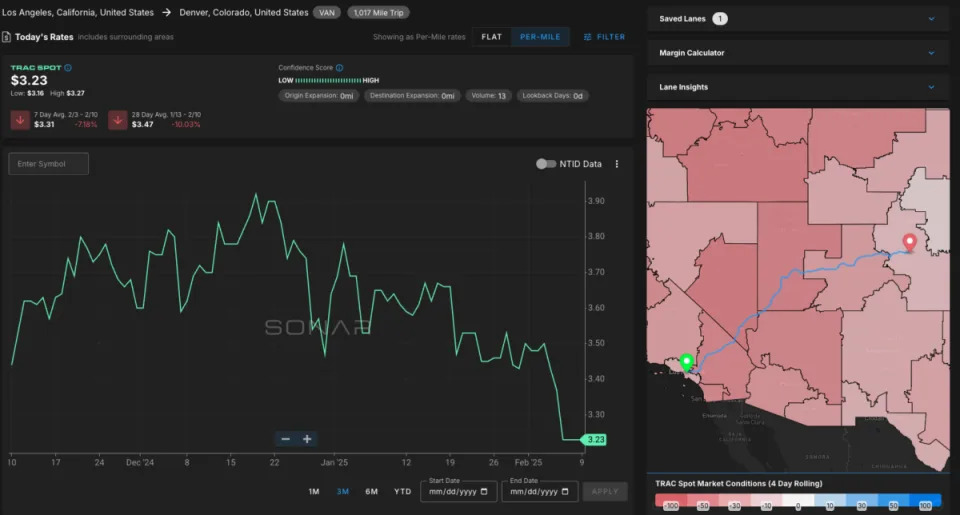

As the fourth quarter of 2024 wrapped up, freight brokers everywhere were left with a collective headache. With the earnings reports of publicly traded brokerages now out in the open, the numbers told a story that most in the industry had already lived through – and it wasn’t pretty. In fact, it was the kind of quarter that had many brokers double-checking their calendars as Q4 historically has been a gangbuster quarter.
C.H. Robinson managed to put up better numbers year over year, but sequentially, its performance was down. Uber Freight, for its part, continued to struggle as it extended its more than two-year run of losses on earnings before interest, taxes, depreciation and amortization. Meanwhile, Landstar disappointed with its guidance, giving investors pause.
RXO, which now has a full handle on the Coyote Logistics integration, was anticipated to keep its streak of decent quarters alive, boosted by the Coyote business. That optimism didn’t fully pan out. Investors made their stance clear — RXO’s stock promptly dropped 14.92% on the day of the company’s Q4 earnings call.
The cost of purchased transportation was on the rise, while sales rates were still recovering from their long, painful decline. RXO CEO Drew Wilkerson put it bluntly: “We were forecasting some sort of recovery in the freight market … and if that did not happen, that we would sacrifice a little bit of volume and potentially a little bit of EBITDA as well. And that is what played out.”
Shippers continued to push for lower rates, while carriers, squeezed by their own rising costs, weren’t exactly in the mood to negotiate. The result? Margin compression, lower gross profit per load and a whole lot of frustration – the exact scenario that is played out every day and that is a surprise only to Wall Street.
The situation raises the ever-looming question of when the freight market will finally turn for the better. There is stability, and hope is growing that the turn has arrived, but is it showing up on the balance sheet?
According to Wilkerson, the first signs of rate increases have started to appear, with purchased transportation costs rising year over year for the first time in two and a half years. While that might be a silver lining, it’s not exactly cause for celebration just yet.
At least everything is basically on an upward trend. It’s certainly better than this time last year.

TRAC Tuesday. This week’s lane goes from Los Angeles to Denver, a lengthy 1,017-mile jaunt over the Rocky Mountains. The Los Angeles market remains one of the largest in the country courtesy of imports at the ports of Los Angeles and Long Beach. Spot rates on this lane are the lowest since the end of October. There is little to suggest that rates will increase, as capacity is loosening in Denver but not experiencing much change in LA. Denver has dropped 1.14% in outbound tender rejections week over week for a 6.28% rejection rate. The good thing about Denver’s dropping OTRI is that shippers and brokers can expect stronger contract carrier compliance.

Who’s with whom . We haven’t made it out completely unscathed in the tariff world yet. President Donald Trump has announced 25% tariffs on all metals imported to the U.S. Both steel and aluminum are subject to these tariffs regardless of the country of origin, meaning the casual $11 billion in steel and $9 billion in aluminum imported from Canada and the $6.5 billion in steel and $686 million in aluminum imported from Mexico will take a massive hit.
In his first administration, Trump did have a 25% tariff on steel with exceptions for Canada, Mexico and Brazil. Those exemptions don’t appear to be in play this time.
This tariff will impact countless manufacturing industries, from cars, buildings and planes all the way to consumer goods such as canned soda.
The back and forth in tariffs has spurred talk about starting to renegotiate the United States-Mexico-Canada Agreement (USMCA) now to refashion free trade among the three countries. The current agreement is set to expire in 2026.
There are talks on levying reciprocal tariffs on countries that have tariffs on U.S. goods. For example, the European Union charges a 10% tariff on U.S.-made cars and the U.S. only charges a 2.5% tariff on cars imported from the EU. Trump’s plan is to change that 2.5% import tariff to a 10% tariff to match what is charged on U.S.-manufactured cars.
The more you know
Borderlands Mexico: Diverse supply chain can limit tariffs’ impact, expert says
Upwell secures $6.5M to automate logistics billing practices
Auto hauler Jack Cooper shutting down: CEO letter to workers
TMS provider Alvys launches integrated marketplace
White House pauses de minimis ban on Chinese e-commerce
The post Check Call: 2024 quarterly earnings miss the mark on Wall Street appeared first on FreightWaves .





